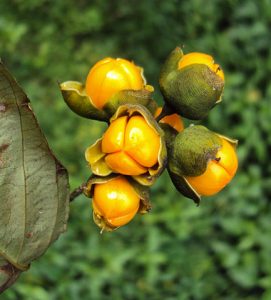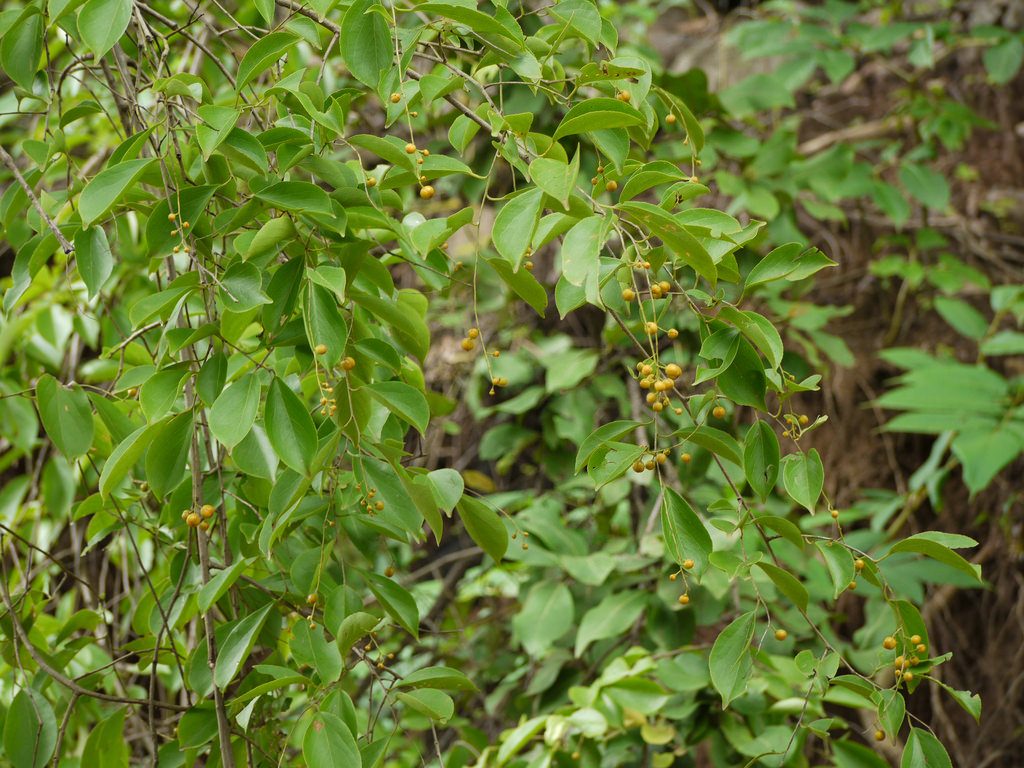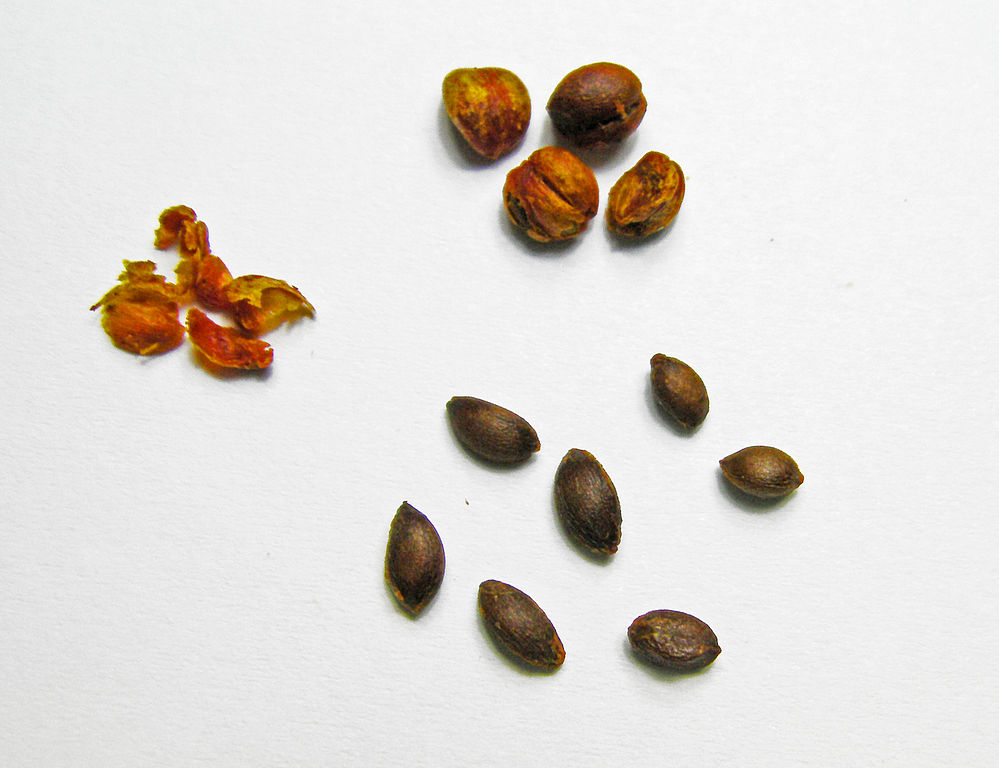Early animal research indicates that Celastrus paniculatus may possess multiple nootropic benefits.

- Enhanced learning & memory. Multiple animal studies report enhanced learning and memory.
- Neuroprotection. C. paniculatus may help protect the brain from neurodegenerative conditions such as Alzheimer’s and Huntington’s.
- Antidepressant & anxiolytic activity. C. paniculatus has been shown to reduce depression and anxiety in rodents.
Overview
Celastrus paniculatus, also known as Malkangni, Jyotishmati, climbing staff tree, and intellect tree, is a woody, climbing Indian shrub. Oil found in its seeds has been used by traditional Ayurvedic medicine as a brain tonic, sedative, diuretic, and anti-inflammatory.
Nowadays, celastrus paniculatus continues to be a popular medicinal plant in India, and is beginning to be sold worldwide as a dietary supplement. In particular, it is growing in popularity as a nootropic capable of boosting cognition and alleviating a variety of mental disorders such as depression and dementia.

How Celastrus Paniculatus Might Help the Brain
Antioxidant activity
Oxidative stress caused by reactive oxygen species is involved in aging and neurodegeneration, suggesting that it plays a major role in cognitive dysfunction. Celastrus paniculatus contains potent antioxidant compounds that can help alleviate oxidative damage in the brain, as demonstrated by reduced levels of malondialdehyde, a marker of oxidative stress, and increased levels of the body’s natural antioxidants – glutathione, superoxide dismutase and catalase. 1
Potential neurotransmitter receptor antagonism
Another proposed mechanism is that certain compounds in Celastrus paniculatus act as neurotransmitter receptor antagonists, blocking the receptor sites for three crucial neurotransmitters – dopamine, serotonin, and norepinephrine. 2
Celastrus paniculatus Potential Nootropic Uses and Benefits
Celastrus paniculatus is mostly used in India, but it is beginning to rise in popularity as a nootropic supplement worldwide. Its potential cognitive benefits include:
- Enhanced learning and memory
- Reduced anxiety
- Improved mood
- Protection against Alzheimer’s, Huntington’s, and other neurodegenerative conditions
However, because of the lack of clinical trials, these benefits have yet to be proven in humans and have only been demonstrated in animals.

Research
Animal Research
Current research of Celastrus paniculatus is largely restricted to animal studies, which exhibit a wide range of nootropic benefits.
Celastrus paniculatus extract appears to improve memory in rats
This study examined the effects of Celastrus paniculatus on learning and memory in rats. The animals were given Celastrus paniculatus seed extract (350 or 1050 mg/kg) or piracetam (100 mg/kg) – a popular nootropic – as a comparison drug, and underwent several behavior tests. The extract was found to improve performance in the memory test, possibly through increasing brain acetylcholine levels.
- The researchers concluded that “the aqueous extract of Celastrus paniculatus seed has dose-dependent cholinergic activity, thereby improving memory performance.” 3
Celastrus paniculatus oil may help fight dementia
In this study, rats with induced Senile Dementia of Alzheimer’s Type (SDAT) were treated with 0.5 and 1 ml doses of C. paniculatus oil. The oil was found to improve animal behavior in several tests, a finding that was matched by reductions in neural damage and oxidative stress.
- The researchers concluded that “CP seed oil has a pronounced antidementic effect and could prove to be a potent deterrent against SDAT.” 4
Celastrus paniculatus oil may have antidepressant activity
This study examined the antidepressant potential of Celastrus paniculatus oil. Mice were given the oil at doses of 50, 100, or 200 mg/kg doses for 14 days, and undertook two behavioral tests of depression. The oil improved performance in both tests, suggesting notable antidepressant effects.
- The researchers concluded that “Celastrus paniculatus seed oil produced significant antidepressant-like effect in mice.”5
Celastrus paniculatus oil may alleviate stress-induced cognitive impairment
This study tested the use of Celastrus paniculatus (CP) oil for stress-related cognitive dysfunction. Rats were split into several groups: control, chronic stress, and stress + CP (400 or 600 mg/kg). Next, they underwent tests of anxiety, spatial learning, and memory. Rats given the oil performed better in all three tests.
- The researchers concluded that “The current study provides a novel perspective on beneficial effect of herbal therapy on stress-induced cognitive dysfunctions.” 6
Celastrus oil may reduce anxiety
This study administered Celastrus oil at doses of 1 and 1.5 g/kg to rats who then underwent tests of behavior. The oil was found to produce a significant anxiolytic effect in the tests.
- The researchers concluded that “…Celastrus oil…exhibited significant anxiolytic activity and did not produce tolerance.” 7
Nootropic Dosage
- There is currently no established dosage of Celastrus paniculatus in humans
- Single ingredient supplements typically come in 500 mg capsule doses
Available Forms
- Celastrus paniculatus seeds
- Celastrus paniculatus oil isolated from the seeds
- Celastrus paniculatus extract – dry extract of the seeds, usually sold in capsules
Supplements in Review Says
- Celastrus paniculatus oil or extract at supplement-recommended dosages.
Celastrus paniculatus holds much potential as a nootropic. Although it’s far too early to recommend Celastrus paniculatus, early research suggests that it may have a wide range of nootropic benefits.
Follow supplement recommendations. There isn’t enough research to recommend a dose, so it’s best to follow the dosages recommended by your specific supplement.
Leave a Reply